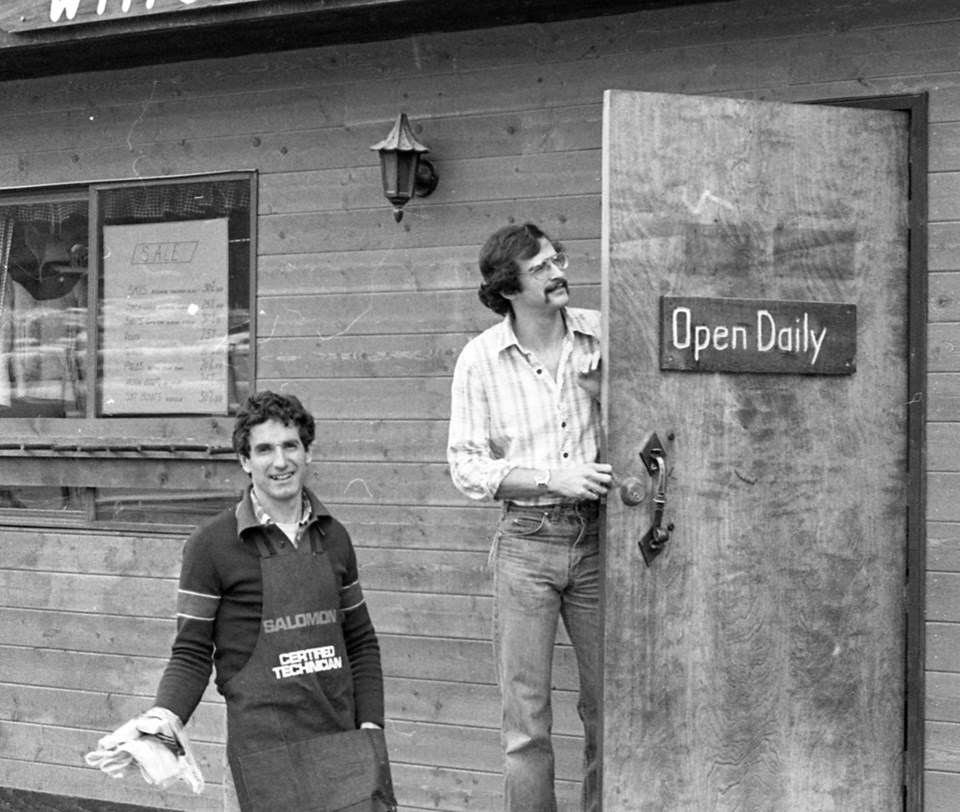As a resort town, we’re pretty used to finding shops, restaurants, and recreation facilities open most days, including weekends and most holidays. In the 1980s, the idea of shopping on Sunday was debated in municipalities across British Columbia and, in some places, could be quite divisive. When the Grocery Store was getting ready to open in January 1981, it was unclear whether it could technically be open seven days a week.
The first federal legislation governing Sunday operations, the Lord’s Day Act, was introduced in 1907, and prohibited “commercial activity” on Sundays with few exceptions. Because of jurisdictional debate, provinces also created their own versions of this type of legislation, often called “blue laws.” These laws were becoming less popular by the 1950s, and by the ’60s, some municipalities were petitioning the provincial government to amend their charters to allow certain commercial activities on Sundays. In Vancouver, for example, people voted to allow sports such as baseball games in 1958, and later entertainment such as movies in 1962.
In late 1980, the provincial government under premier Bill Bennett and the Social Credit Party passed the Holiday Shopping Regulations Act (HSRA), which banned shopping on Sundays and on holidays with some exceptions, but allowed municipalities to hold referendums to approve a local bylaw to allow Sunday shopping.
At first, Whistler’s mayor and council felt a referendum would not be necessary due to the exclusions included in the Act, though it was unclear whether resorts were in fact excluded. Many businesses in Whistler had operated on Sundays for years without issue, often with Sunday as their busiest day of the week, and most continued to do so. Following protests by businesses in Vancouver’s Gastown who wanted to continue opening on Sundays, and with the threat of a $10,000 fine (adjusted for inflation, more than $30,000 today), council held a special meeting on Jan. 12, 1981, and gave the first three readings to Bylaw 197, which would allow for the operation of retail businesses on holidays and Sundays. Once approved by the provincial government, a referendum would be held to determine the fate of Sunday shopping in the resort.
The Whistler Question dedicated multiple editorials to the issue of Sunday shopping and the HSRA. On Jan. 15, the paper stated “Businesses continue to operate seven days a week as they always have and while we are not an historic site (yet), we are a recreational one and should therefore also be exempted from the asinine regulations.”
The paper also pointed out some of the exceptions from HSRA were unclear, depending on whether you defined a number of employees as those working at one given time or all who were on the payroll. In one example, the exclusion of businesses offering rentals of sports and recreation equipment and goods did not mention what would happen if the businesses also sold such items, leading the Question to ask, “Does this mean you can rent skis but you can’t buy goggles on a Sunday?”
After the referendum was announced for February, the Question encouraged eligible voters to get out and support the proposed bylaw.
“It is obvious to us that the future of Whistler as a ski area, never mind a full-fledged destination resort, hinges on the continual operation of all stores on Sundays and holidays,” read one editorial.
“Just remember that when you are on vacation, you expect every day to be the same, and this is true for Sundays also.”
It turned out Sunday shopping was not a very divisive issue in Whistler, though it would take years and hotly debated votes to approve similar bylaws in other municipalities. Four hundred and four voters (about 30 per cent of eligible voters) voted in the referendum: 393 for; seven spoiled (they were all in favour, but marked a tick instead of an “x”); and four against. The result was a 99-per-cent majority, and by the end of February, Bylaw 197 was officially adopted, making Sunday shopping unequivocally legal in Whistler.
In 1985, the Lord’s Day Act was ruled to contravene the Canadian Charter of Rights and Freedoms, and in the late 1980s, a court made a similar decision to end B.C.’s provincial laws banning Sunday and holiday opening hours.




